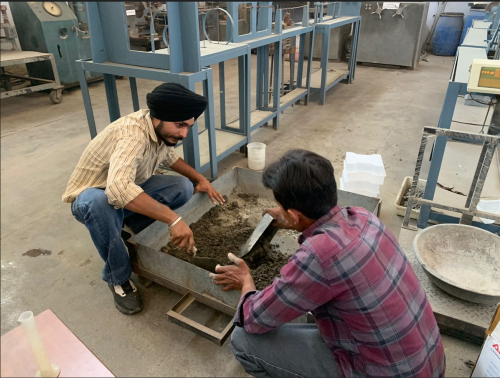Material Testing Lab.
The lab is vital for understanding the fundamental properties and behavior of construction materials under various loading conditions. The laboratory supports the practical component of courses such as CE 212, CE 311, and CE 520, offering hands-on experience with essential tests that assess the strength, durability, and quality of building materials. Through experiments like the compressive strength test of concrete, tensile strength of steel, and hardness and impact testing, students learn how different materials perform and fail under real-world conditions. Equipment such as the universal testing machine (UTM), vicat apparatus, abrasion testing machine, and flexural testing setup allows students to analyze parameters critical to structural design and safety. By linking theoretical concepts with practical evaluation techniques, the lab equips students with the skills and confidence needed to make informed decisions in the field of construction and structural engineering.

Soil Mechanics Lab.
The lab is fundamental for understanding the engineering behavior of soils, which is essential for safe and effective geotechnical design. This lab complements the practical component of courses such as CE 213 providing students with hands-on experience in testing various physical and engineering properties of soil. Experiments like the Atterberg limits, Proctor compaction test, California Bearing Ratio (CBR) test, permeability test, and direct shear test enable students to evaluate soil strength, compressibility, moisture content, and load-bearing capacity. The laboratory is equipped with instruments such as the consolidation apparatus, triaxial shear test setup, and unconfined compression testing machine, which help students simulate field conditions and interpret soil behavior under different stresses. By integrating theory with practical knowledge, the Soil Mechanics Lab prepares students to tackle geotechnical challenges in foundation design, earthworks, and infrastructure development.
Environmental Engineering Laboratory:
The lab plays a crucial role in equipping students with practical skills to monitor, analyze, and manage environmental quality, especially concerning water and wastewater. This lab supports the practical learning objectives of courses such as CE 413, CE 414, and CE 502, offering hands-on experience in conducting essential environmental tests. Experiments include determination of pH, turbidity, dissolved oxygen (DO), biochemical oxygen demand (BOD), chemical oxygen demand (COD) and total suspended solids (TSS) in water and wastewater samples. The lab is well-equipped with modern instruments like digital spectrophotometers, BOD incubators, jar testing apparatus and turbidity meters, enabling students to evaluate water quality and treatment efficiency. By linking theoretical concepts of environmental pollution control with real-time lab analysis, the Environmental Engineering Lab empowers students to design sustainable solutions for water treatment, pollution mitigation and environmental protection, making them industry- and field-ready professionals.

Surveying lab:
The lab is essential for imparting practical skills in land measurement and mapping, which form the foundation of all civil engineering and agricultural infrastructure projects. This lab supports the practical components of courses like CE 111 allowing students to gain hands-on experience with modern and conventional surveying instruments. Key practicals include chaining and compass surveying, plane table surveying, levelling, theodolite traversing, tacheometry, and contour mapping. The lab is equipped with tools such as prismatic compasses, auto levels, digital theodolites, and total stations, enabling students to accurately measure distances, angles, elevations and positions. Through field exercises and data plotting, students develop competence in preparing site plans, contour maps and alignment surveys. The Surveying Lab bridges theoretical knowledge with field applications, ensuring students are well-prepared for real-world challenges in construction, road layout, irrigation planning and land development.

Departmental Library:
The Departmental Library serves as a valuable academic resource center for both undergraduate and postgraduate students, faculty and researchers. It houses a well-curated collection of textbooks, reference books, project reports, theses, manuals and national and international journals related to core and specialized subjects of Civil Engineering and Agricultural Engineering. The library supports courses and research areas such as structural engineering, geotechnical engineering, surveying, hydrology, environmental engineering, and construction technology. By fostering a culture of self-learning and academic inquiry, the departmental library plays a pivotal role in supporting the academic and professional growth of students and faculty.